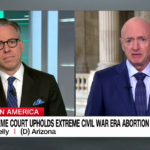
Live Updates: Democrats Embrace Manchin’s Voting Rights Proposal
Democrats and progressive activists who have been working for months on a sweeping voting rights bill quickly embraced on Thursday a new, far narrower plan suddenly put forward by Senator Joe Manchin III, their party’s sole holdout on the issue.
Their decision to do so did nothing to improve the chances that the legislation could get through the Senate, but it reflected another significant goal for Democrats: uniting the party around what it has billed as its highest priority and showing that, were it not for Republican opposition and the filibuster, the elections overhaul would become law.
Much to the growing consternation of Senate Republicans, the alternative ideas put forward by Mr. Manchin — a centrist from West Virginia and the only Democrat who has refused to support what is known as S. 1 — quickly gained traction with progressive Democrats and activists, most notably Stacey Abrams, the voting rights champion in Georgia.
On Thursday, she praised his plan, even though it is more limited in scope than the original Democratic measure. The proposal would make Election Day a holiday, require 15 days of early voting and ban partisan gerrymandering, among other steps.
“What Senator Manchin is putting forward are some basic building blocks that we need to ensure that democracy is accessible, no matter your geography,” Ms. Abrams, a former candidate for Georgia governor, said on CNN.
Given her national standing on the issue, her endorsement was a huge boost for Mr. Manchin’s approach — though it only hardened Republican opposition to a measure they have made clear that they intend to block at all costs.
But as far as Senate Democrats are concerned, it is Mr. Manchin whose support is most important. The reason is the magic number of 50.
Senator Chuck Schumer of New York, the majority leader, has hesitated to bring top Democratic priorities to the floor this year without the backing of all 50 senators. Given the Senate’s even partisan split, it takes every Democrat and Democratic-leaning independent, plus the tiebreaking power of Vice President Kamala Harris, to guarantee a majority. Then, if Republicans mount a filibuster, Democrats can point out that they had the votes to approve legislation, bolstering their argument that the Senate rules are being abused by Republicans and unfairly impeding highly popular policy changes.
With a test vote on the measure looming next week, Mr. Manchin’s opposition to the voting rights measure threatened to be a major embarrassment for Democrats.
So if Mr. Manchin could be brought on board, Democrats appeared more than ready to agree. As Mr. Schumer took procedural steps to set up a vote on the elections bill as early as Tuesday, a spokesman was quick to note that the measure being put on the floor could “act as the vehicle for the voting rights legislation being discussed with Senator Manchin.”
With Mr. Manchin’s support, Democrats could then claim at least a symbolic victory, if not a legislative one, when Republicans block the bill through a filibuster.

PHOENIX — The political fortunes of Katie Hobbs, the Arizona secretary of state, have risen unlike any other Democrat in the country in the tumultuous aftermath of the 2020 presidential election. Now running for governor, she has emerged as a high-profile defender of the state’s election results and critic of Republican attempts to overturn the outcome.
Her path stands in stark contrast to that of another prominent Arizona Democrat: Senator Kyrsten Sinema, a professed maverick who seems to relish thumbing her nose at liberals and has angered many Democrats in recent weeks.
Insisting on bipartisanship, Ms. Sinema has become, along with Senator Joe Manchin III of West Virginia, a key intraparty roadblock to President Biden’s agenda. This week, all eyes in Washington have been on Ms. Sinema and other moderate senators as they pursue a bipartisan infrastructure bill. But by refusing to eliminate the filibuster, she and other Democratic senators have left in doubt the passage of sweeping voting rights legislation that many on the left view as an existential necessity in the face of a nationwide Republican crackdown.
Ms. Hobbs, by contrast, has gained newfound fame in her party for facing down withering attacks from Republicans — including death threats against her and her family that prompted round-the-clock security from state troopers — and for denouncing a widely criticized G.O.P. audit of votes in the state’s largest county as a sham and a threat to democracy. Now she is the most popular statewide elected official, according to some polls, and is starting a bid for governor with more than $1 million in her campaign’s coffers.
Ms. Hobbs’s position is unique in part because so many other elected officials defending results in contested states like Georgia and Michigan were Republican — but in Arizona, the secretary of state was an ambitious Democrat enthusiastic about making headlines.
“If things had gone differently with the election, or the amount of exposure that I got after the election, I don’t feel like I would be in such a strong position,” Ms. Hobbs said in an interview in a Phoenix coffee shop. “I certainly don’t think that things would be going as well as they are so far.”

The Roman Catholic bishops of the United States, flouting a warning from the Vatican, have overwhelmingly voted to draft a statement on the sacrament of the Eucharist, advancing a political push by conservative bishops to deny President Biden communion because of his support of abortion rights.
The decision, made public on Friday afternoon, is a rebuke of the nation’s second Catholic president, the most religiously observant commander in chief since Jimmy Carter, and exposes bitter divisions in American Catholicism. It capped three days of contentious debate at a virtual June meeting of the United States Conference of Catholic Bishops. The measure was approved by a vote of 73 percent in favor and 24 percent opposed.
The Eucharist, also called holy communion, is one of the most sacred rituals in Christianity, and bishops have grown worried in recent years about declining Mass attendance and misunderstanding of importance of the sacrament to Catholic life.
But the move to target a president, who has regularly attended Mass throughout his life, is striking coming from leaders of the president’s own faith, particularly after many conservative Catholics turned a blind eye to the sexual improprieties of former President Donald J. Trump because they supported his political agenda. It reveals a uniquely American Catholicism increasingly at odds with Rome.
Mr. Biden, like Pope Francis, embodies an ascendant liberal Christianity focused less on sexual politics and more on racial inequality, climate change, and poverty. His administration is a reversal of the power abortion opponents, including bishops who advanced the measure, enjoyed under Mr. Trump.
The text of the proposal itself has not been written, and would ultimately require approval by a two-thirds majority vote. The proposed outline, earlier reported by America Magazine, said it would “include the theological foundation for the Church’s discipline concerning the reception of Holy Communion and a special call for those Catholics who are cultural, political, or parochial leaders to witness the faith.”
But the fact that Mr. Biden’s views on abortion are even a matter of public discussion is already a victory for conservative Catholics.
The fight comes as anti-abortion activists across the U.S. are emboldened and as reproductive rights activists want Mr. Biden to speak more forcefully in their defense. State legislatures have introduced more than 500 abortion restrictions over the past five months, and the Supreme Court, with its newly expanded conservative majority, agreed to take up a case on a Mississippi law that bans most abortions at 15 weeks, which could challenge the constitutional right to abortion established in Roe v. Wade. Five of the court’s six Catholic justices were appointed by Republicans.
The United States Conference of Catholic Bishops, an assembly of the country’s 433 active and retired bishops, can issues guideline statements, but it does not have the authority to decide who can or cannot receive the sacrament of communion. That power is reserved for the local bishop, who has autonomy in his diocese, or the Pope.
Cardinal Wilton Gregory, the archbishop of Washington, has made it abundantly clear that he does not support denying communion to Mr. Biden. Bishop-elect William Koenig of Wilmington, Del., Mr. Biden’s hometown, has remained largely quiet on the issue ahead of his installation next month.

As Congress and the Department of Defense debate how to address the ongoing scourge of sexual assault and harassment in the military, a study on the Army released Friday found that age, experience and where soldiers are based strongly correlate to both offenses.
Women at Fort Hood in particular — where an Army specialist was killed by another soldier last year — have a far higher risk of sexual assault at that base in Texas than the average woman in the Army according to the new study, conducted by the RAND Arroyo Center, a federally funded research group.
Using gender and workplace data, researchers found that the total sexual assault risk to Army women at Fort Hood during 2018 was 8.4 percent, compared with a 5.8 percent risk for all women in the Army.
The researchers also found that for both men and women, younger age was associated with increased risk for sexual assault, as were low education levels and junior rank. Fort Hood and Fort Bliss — another installation in Texas with above-average rates of assault — have large numbers of junior ranking, young soldiers. Further, for both men and women, longer deployments on antiterrorism missions also led to higher risk for sexual assault and harassment.
The new findings suggest that “there are location-specific concerns that require targeted interventions into climate and culture and will require additional research to understand,” Dr. Jenna Newman, Dr. Jenna Newman, a social science adviser and the Army’s project lead for the study, said in a news release.
Sexual harassment is more common than sexual assault in the Army, the authors found, but the risk of sexual harassment is highly correlated with the risk of sexual assault, something other research has also suggested.
A bill sponsored by Senator Kirsten Gillibrand, Democrat of New York, would remove military commanders from a role in prosecuting service members for sexual assault, which she and her supporters in the Senate argue would lead to increased prosecutions and deterrence. At the same time, a panel appointed by Defense Secretary Lloyd J. Austin III made a similar recommendation and was expected to release its final findings in the coming weeks.

Senate Democrats have begun privately weighing a sprawling economic package as much as $6 trillion — including $3 trillion that is paid for — even as a bipartisan group of senators works to draw support for a much narrower infrastructure plan that would devote $579 billion in new money to fund physical public works projects.
The details of both plans remain in flux, as lawmakers work to maneuver some, if not all, of President Biden’s economic agenda around the 60-vote filibuster threshold in the Senate and razor-thin margins in the House. For now, the divergent efforts are proceeding in parallel, with Republicans and Democrats pushing forward on their compromise proposal and Democrats preparing to use the fast-track budget process known as reconciliation to avoid a filibuster of their far larger plan and push it through over Republican opposition.
At a meeting on Wednesday convened by Senator Chuck Schumer of New York, the majority leader, Democrats on the Budget Committee discussed taking unilateral action on a package as large as $6 trillion, with half of it paid for, should the bipartisan talks fail to produce a deal, according to four people familiar with the discussion. The details of the emerging discussions were reported earlier by Politico.
The Democrats also discussed potentially including measures to expand Medicare, including lowering the eligibility age to 60 and expanding benefits for all beneficiaries to cover dental, hearing and vision care, according to three of the people, who disclosed details on condition of anonymity because they are still in flux.
Democrats also discussed incorporating revisions to immigration law in the package, Senator Tim Kaine, Democrat of Virginia, told reporters on Wednesday, calling it a “big-picture” discussion given that the strict budgetary rules governing the reconciliation process could force lawmakers to modify or jettison priorities in the package.
But Democrats acknowledged that a final package might be smaller and narrower than the ambitious proposals discussed on Wednesday, given that all 50 senators who caucus with the Democrats and nearly every House Democrat will have to support the measure for it to become law.
“If you’re doing a package like this and try to get 50 out of 50, there’s two ways to get 50 out of 50: take out things that people don’t like, or add in things that they like so much that they’re willing to support things that they don’t love,” Mr. Kaine said.

Congress is not expected to move this month to override a crush of state laws that, as soon as July 1, will challenge the N.C.A.A. rules that have kept college athletes from making money off their fame.
The absence of an accord, or even a clear timeline for one, by the start of July would be a blow to the N.C.A.A. and its most influential and wealthy conferences, which have spent many months and millions of dollars seeking intervention from Washington. Although an agreement could still emerge this year, the prospects for a federal measure to advance before the state laws have gone from a long shot toward essentially nonexistent.
In 2019, a law to let college athletes hire agents, cut endorsement deals and monetize their social media platforms cleared the California Legislature and the governor’s desk with ease. That measure is not currently scheduled to take effect until 2023.
But Alabama, Florida, Georgia, Mississippi, New Mexico and Texas have laws that are scheduled to take effect on July 1.
Any coast-to-coast baseline standard that might be in effect early next month, though, will almost certainly have to come from the N.C.A.A. itself. With more state laws scheduled to come into force in the months ahead, public officials and college sports executives alike believe that changes or waivers to N.C.A.A. rules would amount to a stopgap.
On Capitol Hill on Thursday, when the Committee on Commerce, Science and Transportation met for the second time in eight days to hear testimony about college sports, the divide between congressional negotiators was clear with a glance at the dais: Senator Roger Wicker of Mississippi, the panel’s ranking Republican, was absent. On Wednesday, Wicker announced a survey of college athletes “to solicit their views on what they would like to see” in a federal measure. Responses are due on June 25, around the time senators are expected to leave Washington for a recess that is tentatively scheduled to last until July 12.
Asked in an interview outside the Senate chamber on Thursday afternoon whether he saw a path to a deal by the end of this month, Wicker replied, “It would be a surprise to me at this point.”

Missouri has become the latest state to throw down a broad challenge to the enforcement of federal firearms laws, as Republican-controlled state legislatures intensify their fierce political counterattack against President Biden’s gun control proposals.
A bill signed by Gov. Mike Parson over the weekend — at a gun store called Frontier Justice — threatens a penalty of $50,000 against any local police agency that enforces certain federal gun laws and regulations that constitute “infringements” of Second Amendment gun rights.
At least eight other states — Arkansas, Arizona, Montana, North Dakota, Tennessee, West Virginia, Idaho and Texas — have taken similar action this year, passing laws of varying strength that discourage or prohibit the enforcement of federal gun statutes by state and local agents and officers.
The new law “is about protecting law-abiding Missourians against government overreach and unconstitutional federal mandates,” Mr. Parson and the attorney general, Eric Schmitt, said in a letter defending the law on Thursday to the U.S. Justice Department. They said the state would “reject any attempt by the federal government to circumvent the fundamental right Missourians have to keep and bear arms to protect themselves and their property.”
In interviews, the sponsors of the bill in the Missouri House and Senate acknowledged that the law would most likely have little immediate effect on the current operations of local and state police agencies, since there is presently little difference between state and federal gun laws in Missouri.
The Republican lawmakers said their main intent was to guard against the potential of more wide-ranging legislation from Washington, where Democratic lawmakers have proposed a major expansion of federal background checks, an extension of the time period in which federal officials can review purchases and bills to restrict the sale of popular semiautomatic weapons like AR-15s.
A growing number of Republican-sponsored gun bills are making their way through state legislatures, all with the purpose of easing restrictions and oversight in anticipation of Mr. Biden’s next moves.
Among the most significant are new laws in Tennessee, Iowa and Texas that now allow most adults to carry firearms without a permit.

When Johnson & Johnson’s single-dose coronavirus vaccine was authorized for emergency use in the United States in late February, it was seen as a breakthrough for reaching vulnerable and isolated Americans, a crucial alternative to vaccines that require two shots weeks apart and fussier storage. It was soon popular on college campuses, in door-to-door campaigns and with harder-to-reach communities that often struggle with access to health care.
But with only 11.8 million doses administered in the United States so far — less than 4 percent of the total — the “one and done” vaccine has fallen flat.
States have warned that they may not find recipients for millions of doses that will soon expire, partly because the vaccine’s appeal dropped after it was linked to a rare but serious blood-clotting disorder and injections were paused for 10 days in April.
The vaccine took another hit last week, when regulators told Johnson & Johnson that it should throw out tens of millions of additional doses produced at a plant in Baltimore because they might be contaminated.
Although millions of Americans have yet to be inoculated, the vaccine’s role in the United States is fading fast. Experts lament a missed opportunity to address health disparities with a shot that should have been ideal for reaching vulnerable populations.
“It’s just not what I think anybody would have hoped it would be when it came out,” said Dave Baden, the chief financial officer of the Oregon Health Authority.
















